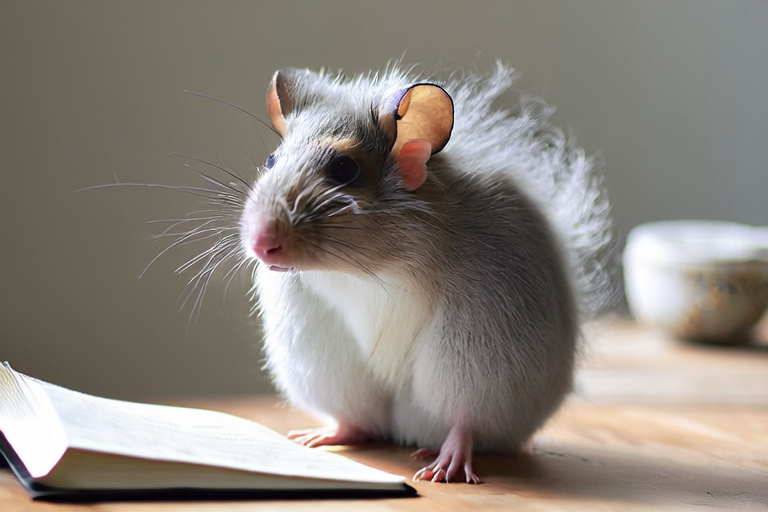Fancy Rat: The Ultimate Guide for First-Time Owners
Welcome to the world of fancy rats! These delightful creatures are becoming increasingly popular as pets due to their intelligence, sociability, and relatively low maintenance. Whether you’re an experienced pet owner or new to the scene, this guide will provide you with everything you need to know about raising a healthy and happy fancy rat.
Basic Characteristics of Fancy Rats
Fancy rats, also known as laboratory rats, come in a variety of colors and patterns. They typically have short, smooth fur that can be white, black, brown, gray, or a mix of these colors. Their bodies are sleek and muscular, and they have large ears, small eyes, and long tails that help them balance. On average, fancy rats weigh between 300-500 grams and can grow up to 9 inches in length.
One of the most endearing traits of fancy rats is their friendly and curious nature. They are highly social animals that thrive on interaction with their human companions. Rats are intelligent and can learn tricks, play games, and even bond with their owners through positive reinforcement training. With proper care, fancy rats can live up to three years, making them a long-term commitment.
Creating a Suitable Living Environment
To ensure your fancy rat has a comfortable and stimulating environment, it’s important to provide them with a spacious cage. The minimum recommended size for a single rat is 18x24x18 inches, but larger cages are always better. Make sure the cage has multiple levels and plenty of hiding spots, such as tunnels and hammocks, to keep your rat entertained.
It’s crucial to maintain a clean living space for your rat. Clean the cage at least once a week, removing any soiled bedding and replacing it with fresh materials like shredded paper or aspen wood shavings. Avoid cedar and pine shavings, as they can be harmful to your rat’s respiratory system. Provide your rat with soft bedding material for comfort, such as fleece blankets or towels, and make sure they have access to a water bottle and food bowl.
Daily Care and Feeding
Feeding your fancy rat a balanced diet is essential for their health and well-being. A good quality commercial rat food, available at most pet stores, should form the basis of their diet. Supplement their diet with fresh fruits and vegetables, such as carrots, apples, and broccoli, but avoid feeding them avocado, chocolate, or caffeine. Provide your rat with fresh water daily, and clean their water bottle regularly to prevent bacterial growth.
Like all animals, fancy rats require certain nutrients to stay healthy. In addition to a balanced diet, you may want to consider supplementing their food with vitamin C, as rats cannot produce this vitamin themselves. Offer your rat a variety of foods to ensure they get all the necessary nutrients. Monitor their weight and adjust their diet accordingly.
Regular health checks are important to catch any potential issues early. Check your rat’s eyes, nose, ears, and mouth for signs of infection or injury. Look for any lumps or bumps under their skin, and check their teeth for overgrowth. If you notice any unusual behavior or physical changes, consult a veterinarian immediately.
Training and Interaction
Positive reinforcement training is an effective way to teach your fancy rat tricks and commands. Start by rewarding your rat with treats when they perform desired behaviors, such as coming when called or sitting on your hand. Be patient and consistent, and gradually increase the difficulty of the tasks you ask your rat to perform.
Spending time with your rat each day is essential for building a strong bond. Handle your rat gently and frequently, and provide them with toys and activities to keep them mentally stimulated. Rats are social animals and enjoy interacting with their human companions. By spending time together, you can strengthen your relationship and create a happy and healthy living environment for your rat.
Common Health Issues and Prevention
Like all animals, fancy rats are susceptible to various health issues. Respiratory infections, tumors, and dental problems are some of the most common issues faced by fancy rats. To prevent these issues, maintain a clean living environment, provide a balanced diet, and schedule regular veterinary check-ups.
If you notice any signs of illness, such as lethargy, loss of appetite, or discharge from the eyes or nose, contact your veterinarian immediately. Early intervention can make a significant difference in the outcome of many health issues.
Useful Tips for Raising Fancy Rats
Raising fancy rats can be a rewarding experience, but there are a few things to keep in mind. First, make sure your rat has plenty of opportunities to exercise and play. Second, provide your rat with a variety of toys and activities to keep them mentally stimulated. Finally, be patient and gentle when handling your rat, and take the time to build a strong bond with your pet.
By following these tips and providing your fancy rat with a loving and supportive home, you can ensure they live a long and happy life. Remember, owning a fancy rat is a commitment, but it’s one that can bring great joy and companionship. Happy rat keeping!
